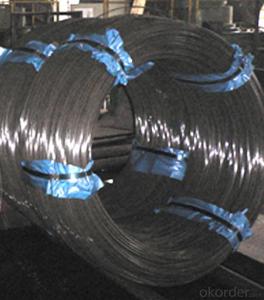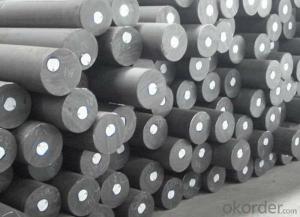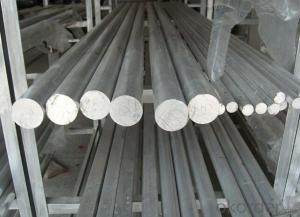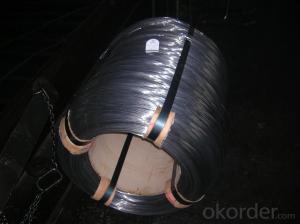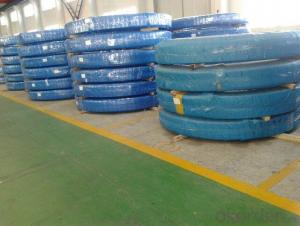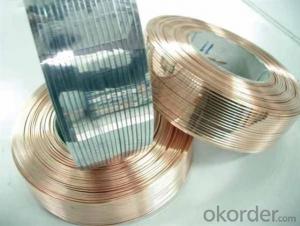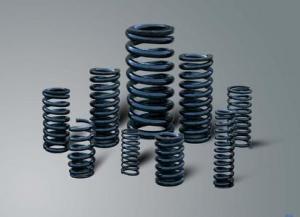HARD DRAWN SPRING STEEL WIRE
- Loading Port:
- China Main Port
- Payment Terms:
- TT OR LC
- Min Order Qty:
- -
- Supply Capability:
- -
OKorder Service Pledge
OKorder Financial Service
You Might Also Like
Steel grade should be 82B,65Mn,70#,72B,M10etc.Size from 0.4-12.0mm,mainly produced into door springs.coil weight can reach 1200KGS.we now export to South africa,SAUDI ARABIA,IRAN and INDIA.
We can satisfying market demands constantly and empoldering new product;can offering wires according to German standards(DIN17223/1,DIN17223/2),American standards(ASTM A227/A227M,ASTM A228/228M,ASTM 231/A231M,ASTM A401/401M),Japanese standards(JIS G3521,JIS G3522,JIS G3560,JIS G3561).and European standards(DIN EN10270-1,DIN10270-2)and so on.
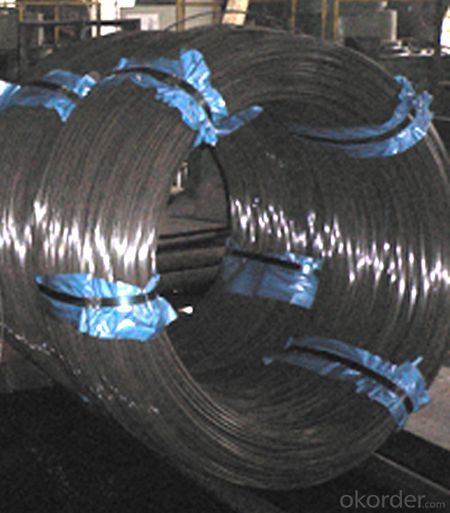
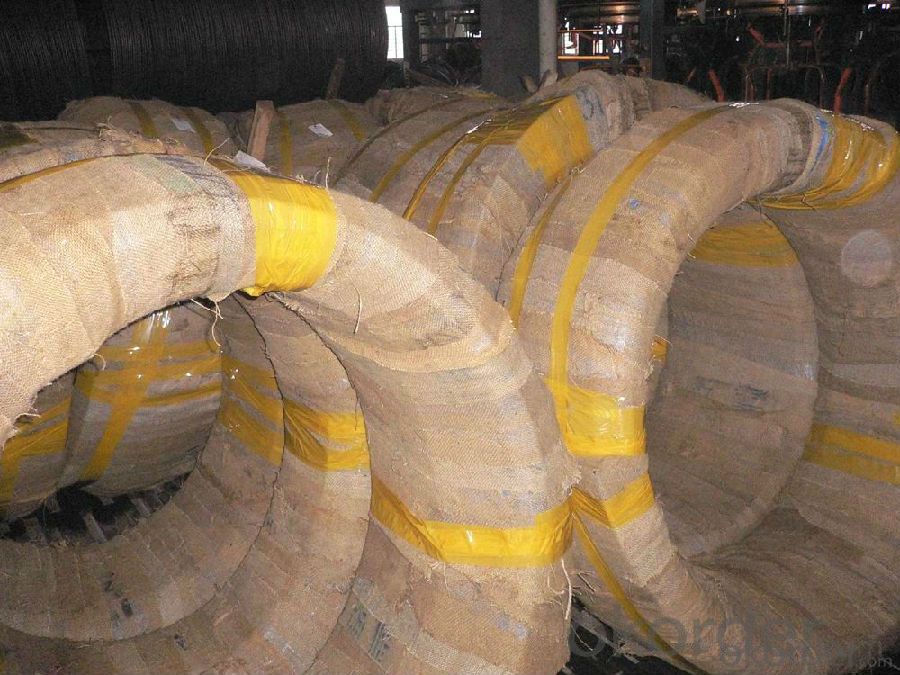
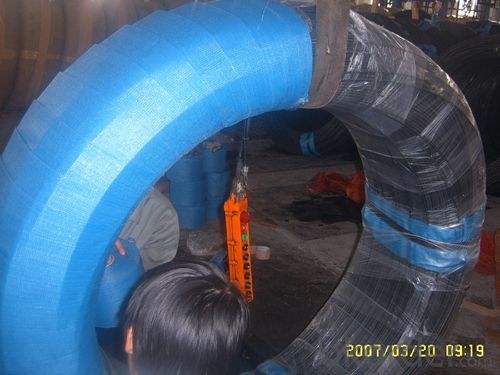
- Q: What are the non-destructive testing methods used for special steel?
- There are several non-destructive testing (NDT) methods that are commonly used for special steel. These methods are designed to detect flaws or defects in the steel without causing any damage to the material. One of the most widely used NDT methods for special steel is ultrasonic testing. This technique involves sending high-frequency sound waves through the steel and analyzing the echoes that are reflected back. By measuring the time it takes for the sound waves to travel through the steel and return, technicians can determine the thickness, density, and internal structure of the material. Ultrasonic testing is particularly effective at detecting cracks, voids, or inclusions in the steel. Another commonly used NDT method for special steel is magnetic particle testing. This technique involves applying a magnetic field to the surface of the steel and then coating it with a magnetic powder. Any defects or irregularities in the steel will create magnetic flux leakage, causing the magnetic particles to cluster and form visible indications. This method is particularly effective at detecting surface cracks or discontinuities in the steel. Liquid penetrant testing is another NDT method that is often used for special steel. This technique involves applying a liquid dye or fluorescent material to the surface of the steel. The dye penetrates any surface cracks or defects, and after a specified dwell time, excess dye is removed. A developer is then applied, which draws out the dye from any flaws, making them visible under UV light. This method is effective at detecting surface discontinuities and is commonly used in the aerospace and automotive industries. Radiographic testing is another NDT method that can be used for special steel. This technique involves exposing the steel to X-rays or gamma rays and capturing the resulting image on a film or digital detector. By analyzing the radiographic image, technicians can detect internal flaws such as cracks, voids, or inclusions in the steel. This method is particularly useful for thicker sections of steel or when access to the material is limited. In conclusion, non-destructive testing methods such as ultrasonic testing, magnetic particle testing, liquid penetrant testing, and radiographic testing are commonly used for special steel. These methods allow for the detection of flaws or defects in the steel without causing any damage to the material, ensuring its integrity and reliability.
- Q: How does special steel contribute to the telecommunications aftermarket industry?
- The telecommunications aftermarket industry heavily relies on special steel to manufacture and maintain telecommunications equipment. This type of steel is specifically designed to possess exceptional properties, such as high strength, corrosion resistance, and durability, which are crucial for the demanding conditions of the telecommunications sector. One of the main contributions of special steel to the telecommunications aftermarket industry is its use in the production of communication towers and transmission structures. These structures must endure extreme weather conditions, such as strong winds and heavy loads, while providing reliable support for antennas and other equipment. Special steel meets these requirements, ensuring the longevity and stability of communication towers. Moreover, special steel is extensively used in manufacturing cables and wires for telecommunications systems. These cables must transmit signals without any loss or interference, and the unique properties of special steel, such as high electrical conductivity and low resistance, make it an ideal material for this purpose. The use of special steel in cables helps maintain the quality and efficiency of telecommunications networks. Another significant contribution of special steel is its role in producing equipment enclosures and cabinets. These enclosures protect sensitive electronic components from environmental factors, including moisture, dust, and extreme temperatures. Special steel, with its corrosion-resistant properties, ensures the longevity and reliability of these enclosures, safeguarding the valuable equipment inside. Furthermore, special steel is also utilized in manufacturing various components and accessories used in the telecommunications aftermarket industry, such as connectors, brackets, and hardware. These components are essential for assembling and maintaining telecommunications equipment. Special steel's high strength and durability make it the preferred choice for these components, guaranteeing their long-lasting performance. In conclusion, special steel significantly contributes to the telecommunications aftermarket industry by providing the necessary materials for manufacturing and maintaining telecommunications equipment. Its exceptional properties, including high strength, corrosion resistance, and durability, make it an ideal choice for communication towers, cables, enclosures, and various components. By utilizing special steel, the telecommunications industry ensures the reliability, efficiency, and longevity of its equipment, ultimately benefiting both service providers and end-users.
- Q: How does special steel contribute to the agricultural sector?
- Special steel contributes to the agricultural sector in several ways. Firstly, special steel is known for its strength and durability, making it an ideal material for manufacturing various agricultural machinery and equipment. This includes tractors, plows, harvesters, and irrigation systems, among others. These machines require robust and reliable components that can withstand the demanding conditions of agricultural work, and special steel provides the necessary strength and resistance to wear and tear. Additionally, special steel can be used to produce high-quality cutting tools that are essential in farming operations. Implements such as sickles, scythes, and pruning shears need to have sharp and durable blades to efficiently cut through vegetation. Special steel's hardness and strength make it a suitable material for manufacturing these tools, ensuring they retain their sharpness even after prolonged use. Furthermore, special steel can contribute to the agricultural sector by enabling the construction of sturdy and durable infrastructure. Agricultural buildings, storage facilities, and fencing often require strong and corrosion-resistant materials to withstand the elements and protect crops, livestock, and equipment. Special steel, with its resistance to rust and structural integrity, can be used in the construction of barns, silos, sheds, and fencing, providing long-lasting and reliable structures. In conclusion, special steel plays a crucial role in the agricultural sector by providing the necessary strength, durability, and corrosion resistance required for the manufacturing of machinery, cutting tools, and infrastructure. Its properties contribute to improved efficiency, productivity, and reliability in agricultural operations, ultimately benefiting farmers and the overall agricultural industry.
- Q: What are the factors that affect the weldability of special steel?
- The factors that affect the weldability of special steel include the chemical composition of the steel, the presence of impurities or alloying elements, the heat treatment history, the thickness of the steel, the welding process and technique used, and the pre-weld and post-weld treatments.
- Q: What are the limitations of using special steel in electrical applications?
- Using special steel in electrical applications comes with several limitations. Firstly, it tends to be more expensive compared to other commonly used materials like copper or aluminum, making it less cost-effective for large-scale projects. Another drawback is its relatively high electrical resistivity, which hampers its efficiency in conducting electricity. This results in higher energy losses and lower overall efficiency in electrical systems, which is particularly concerning for energy-efficient applications like power generation or transmission. Moreover, special steel lacks the malleability and ductility found in materials like copper, making it less suitable for applications requiring shaping or forming. Working with it can be more challenging and may necessitate complex manufacturing processes. Furthermore, special steel is more susceptible to corrosion compared to materials like copper or aluminum. In environments with high humidity or moisture exposure, this can significantly limit its use in electrical applications. Corrosion not only degrades the steel's electrical properties but also reduces its lifespan, leading to increased maintenance and replacement costs. Lastly, special steel may not be as readily available or easily sourced as other materials commonly used in electrical applications. This can present challenges in terms of availability, lead times, and potential disruptions in the supply chain, ultimately impacting project timelines and overall productivity.
- Q: Can special steel be used in the textile manufacturing industry?
- Yes, special steel can be used in the textile manufacturing industry. It is often used for making various machinery and equipment, such as looms, spinning machines, and knitting needles, due to its durability, strength, and resistance to wear and tear. Special steel can also be used for manufacturing textile accessories like fasteners, hooks, and needles, providing a reliable and efficient solution for the industry.
- Q: Can special steel be used in renewable energy applications?
- Yes, special steel can be used in renewable energy applications. Special steel alloys such as stainless steel and high-strength low-alloy (HSLA) steel are commonly used in the manufacturing of wind turbines, solar panels, and hydroelectric power systems. These alloys offer excellent corrosion resistance, high strength, and durability, making them ideal for withstanding harsh environmental conditions and ensuring long-term performance in renewable energy applications.
- Q: How does special steel contribute to the aerospace material weight reduction?
- Special steel contributes to aerospace material weight reduction through its unique properties and characteristics. Special steel alloys, such as high-strength low-alloy (HSLA) steels, offer a combination of strength, durability, and lightness that makes them ideal for aerospace applications. These steels are engineered to possess high strength-to-weight ratios, meaning they provide exceptional strength while being relatively lightweight. By using special steel in the construction of various components and structures in aircraft, the overall weight of the aircraft can be significantly reduced. This reduction in weight leads to improved fuel efficiency, increased payload capacity, and enhanced maneuverability, all of which are critical factors in aerospace engineering. Therefore, special steel plays a vital role in helping to achieve weight reduction objectives in the aerospace industry.
- Q: How does special steel perform in terms of machinability?
- Special steel typically performs well in terms of machinability. It is specially designed to have improved cutting, drilling, and shaping properties, making it easier to work with using various machining processes. Special steel often has a more consistent composition and structure, which results in reduced tool wear, better surface finish, and increased productivity during machining operations.
- Q: What are the different applications of stainless special steel?
- Stainless special steel, also known as stainless steel, is a versatile material that finds applications in various industries due to its unique properties. Some of the different applications of stainless special steel include: 1. Construction: Stainless steel is widely used in the construction industry for its durability and corrosion resistance. It is used in structural components, bridges, building facades, and roofing materials. 2. Automotive industry: Stainless steel is extensively used in the automotive sector for its strength, heat resistance, and durability. It can be found in exhaust systems, mufflers, catalytic converters, fuel tanks, and various other components. 3. Medical equipment: Stainless steel is the material of choice in the medical field due to its high corrosion resistance and biocompatibility. It is used in the manufacture of surgical instruments, implants, orthopedic devices, and medical equipment. 4. Food processing industry: Stainless steel is widely used in the food industry due to its hygienic properties. It is used in the production of food processing equipment, storage tanks, food preparation surfaces, and utensils. 5. Aerospace industry: Stainless steel is used in the aerospace industry for its strength, heat resistance, and corrosion resistance. It is used in the manufacturing of aircraft parts, engine components, and structural elements. 6. Chemical industry: Stainless steel is highly resistant to corrosion from various chemicals, making it suitable for applications in the chemical industry. It is used in the production of tanks, pipes, valves, and other equipment that come into contact with corrosive substances. 7. Energy sector: Stainless steel is used in the energy industry for various applications. It is used in the construction of power plants, oil and gas refineries, pipelines, and renewable energy systems such as wind turbines and solar panels. 8. Marine industry: Stainless steel is extensively used in marine environments due to its excellent corrosion resistance properties. It is used in the manufacture of boat fittings, propellers, underwater structures, and offshore platforms. 9. Household appliances: Stainless steel is commonly used in household appliances due to its aesthetic appeal, durability, and resistance to stains and scratches. It can be found in kitchen appliances such as refrigerators, ovens, dishwashers, and washing machines. 10. Art and design: Stainless steel is increasingly being used in art installations, sculptures, and architectural designs due to its aesthetic appeal, versatility, and ability to withstand outdoor conditions. In summary, stainless special steel has a wide range of applications across industries due to its durability, corrosion resistance, strength, heat resistance, and aesthetic appeal. It plays a crucial role in construction, automotive, medical, food processing, aerospace, chemical, energy, marine, household appliances, and artistic fields.
Send your message to us
HARD DRAWN SPRING STEEL WIRE
- Loading Port:
- China Main Port
- Payment Terms:
- TT OR LC
- Min Order Qty:
- -
- Supply Capability:
- -
OKorder Service Pledge
OKorder Financial Service
Similar products
Hot products
Hot Searches
Related keywords
